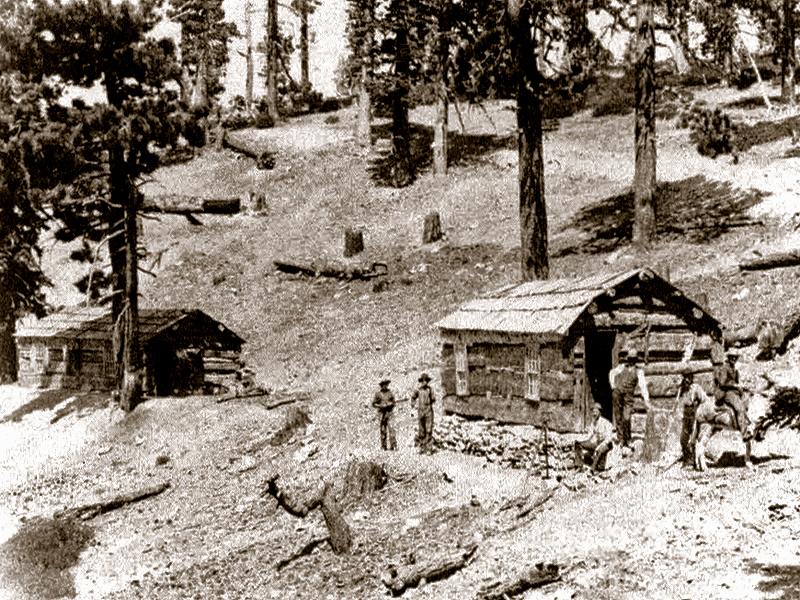The Gold Ridge Mine
Posted: Mon Oct 22, 2018 2:06 pm
The Gold Ridge Mine, originally known as the Agamemnon Mine is located in Upper San Antonio Creek on Mt. Baldy, between
San Antonio Falls and the San Antonio (Sierra Club) Ski Hut. It operated from 1897-1907. This was a fairly large operation,
with much optimism and little success.
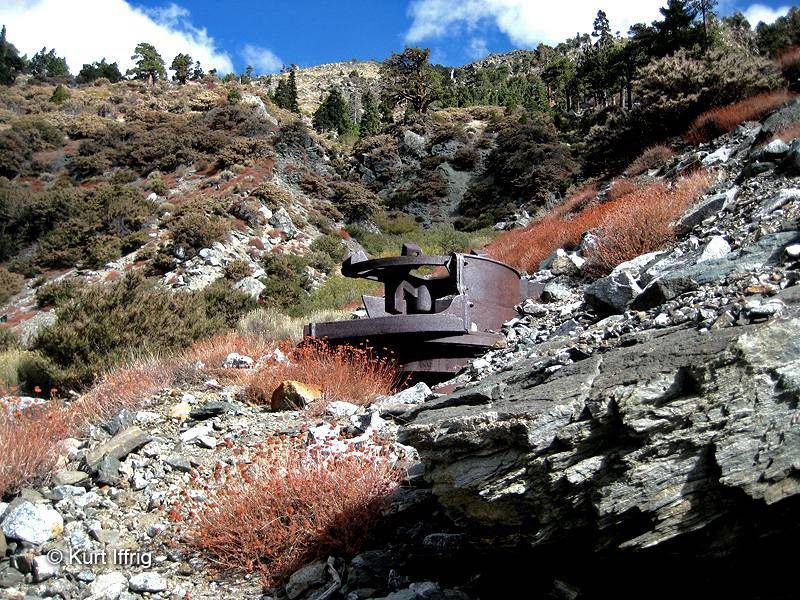
The rock crusher (full name Huntington's Centrifugal Roller Quartz Mill) was invented in 1898. It was a brand new technology
that not only crushed ore, but separated the gold from it. This unit weighs a ton and probably cost a bundle. As far as I know
It's the only one remaining in the San Gabriel Mountains. The inventor, Frank Atwood Huntington patented multiple inventions,
including a gasoline engine that powered one of the first cars in America. This mine site also had a traditional five stamp mill.
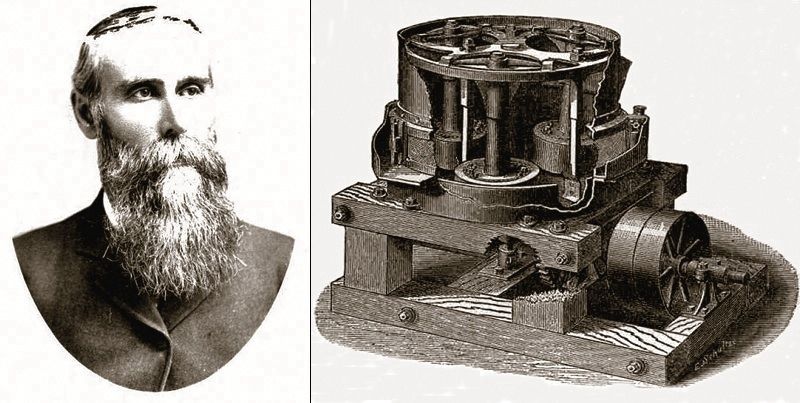
This was a gasoline powered unit. You can see in the diagram above where these two pieces went.
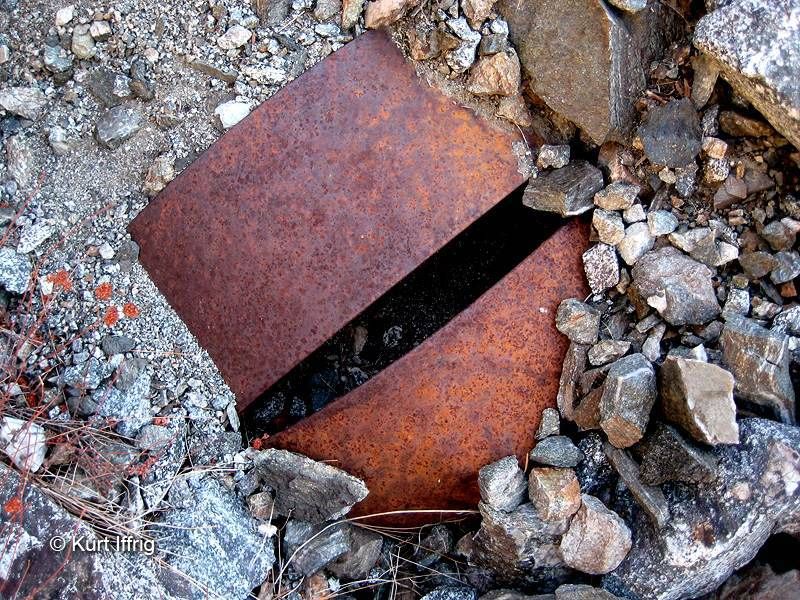
Here's a top view of the crusher. This metal is over half an inch thick, so it must have taken a massive hit to break it in half.
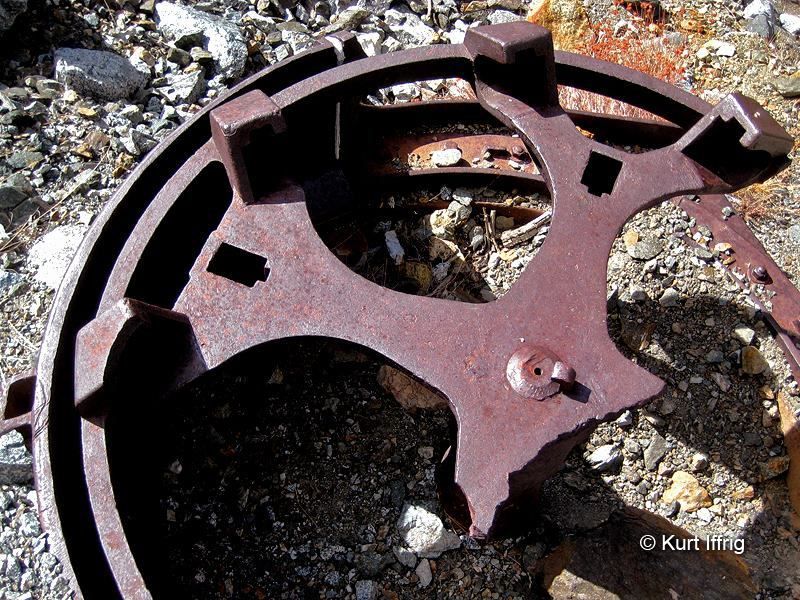
This may have been a part of the interior of the rock crusher. Or part of the mount. In 1907 the crusher was broken in half
by something referred to as the slide of 1907. It was described as an avalanche, but more likely it was a giant rock slide.
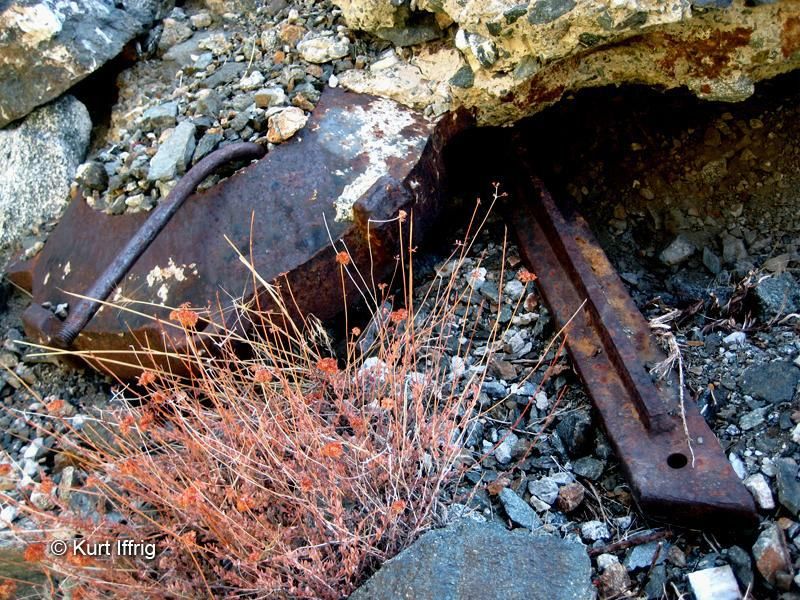
These metal straps were probably used to secure the rocky hillside (unsuccessfully). They can be found next to the mill.
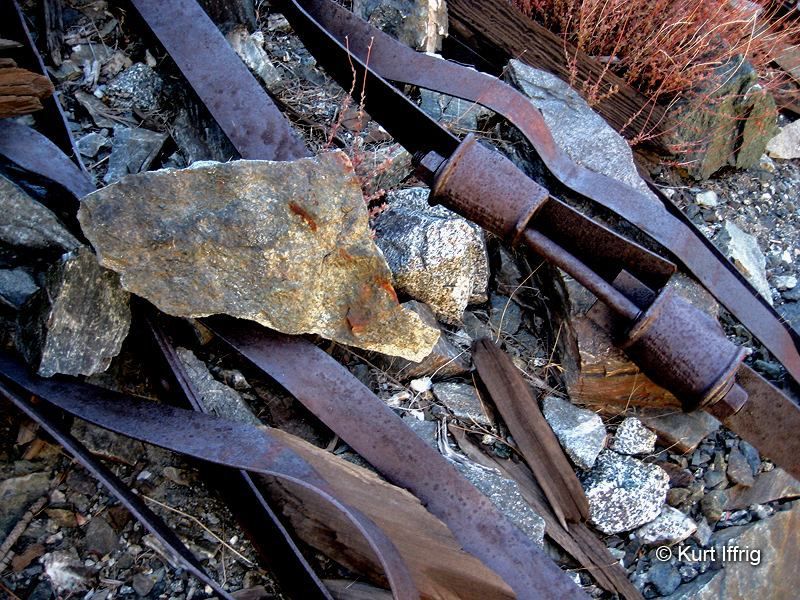
Here's a view of part of the mine site in the late 1800s. All of this was probably washed away by the great flood of 1938.
To me this looks like a water dam at the top, an ore hopper below and the stamp mill was probably behind this structure.
The circular barrel to the right looks like a cyanide leeching tank made out of redwood.
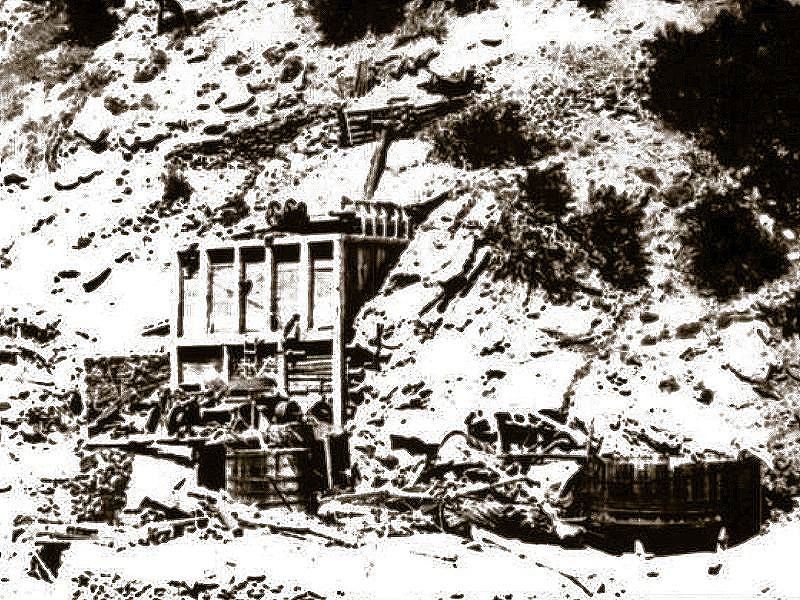
These are the remains of the mess hall (kitchen). Nearby is a flat where the foreman's cabin rested.
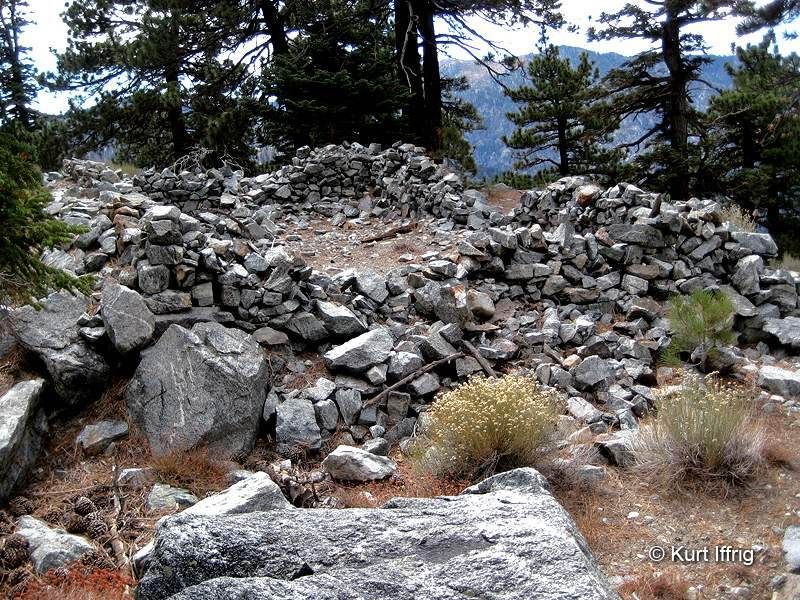
This is part of the stovetop. Remnants of the stovepipe can be found nearby.
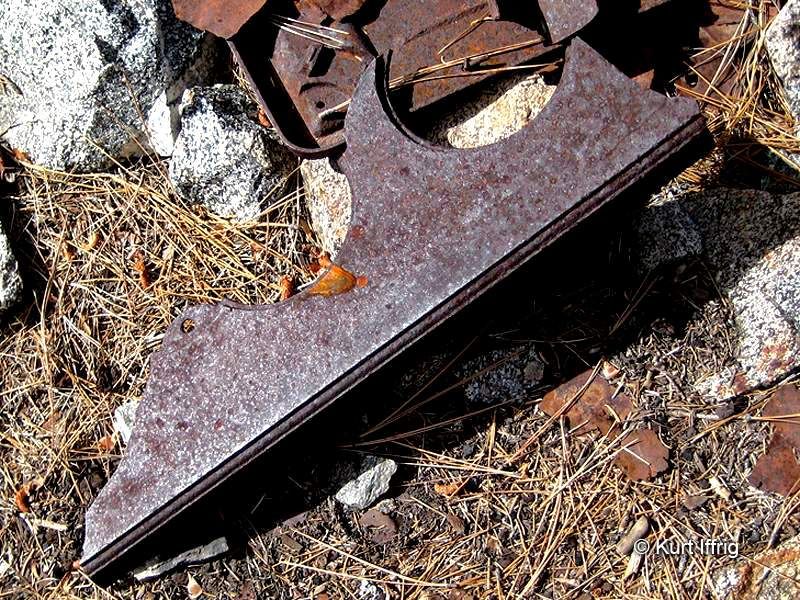
Pieces of the stovepipe found inside the ruins.
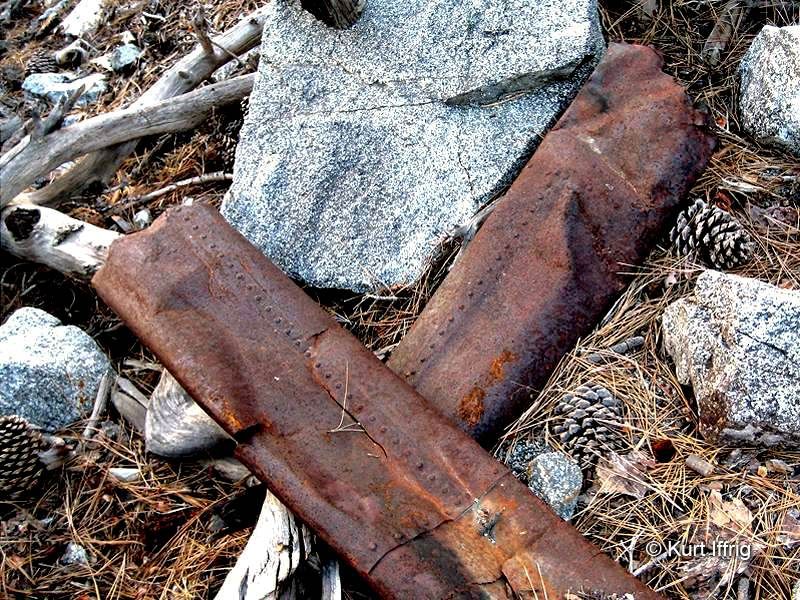
An early morning view from near the mess hall ruins looking south, towards Claremont.
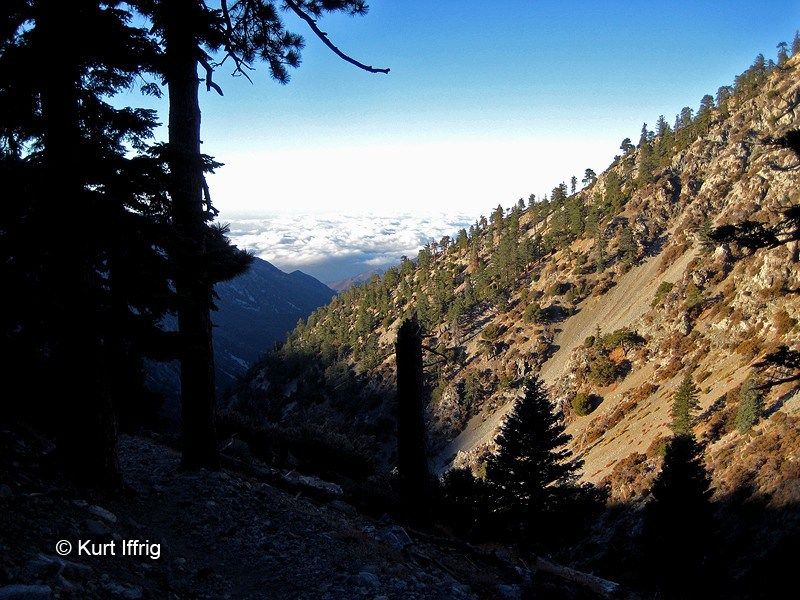
Here's a view from inside the ruins, looking toward Baldy Bowl
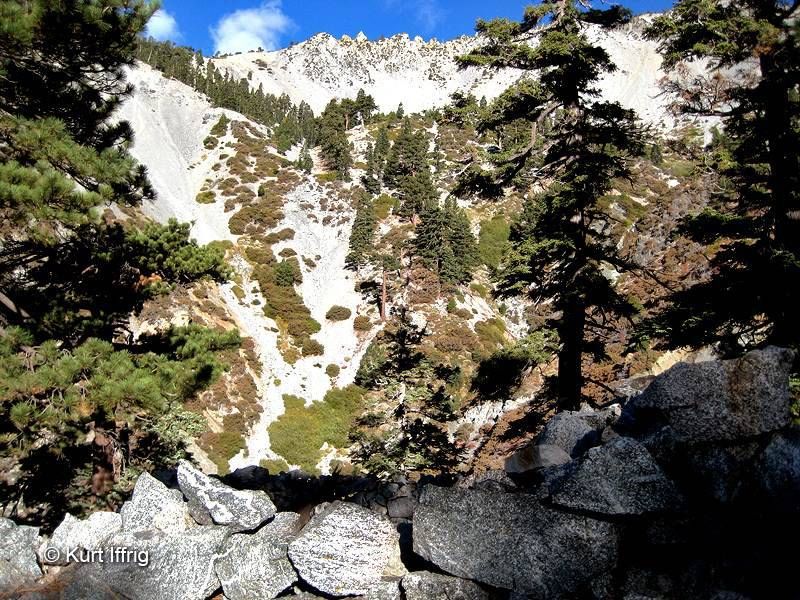
Vintage photos from the mine site, left is the foreman's cabin, right top is the crusher before it was broken (markings
say it was manufactured in Mexico), right bottom is the mess hall. Photos are part of the Will Thrall collection.
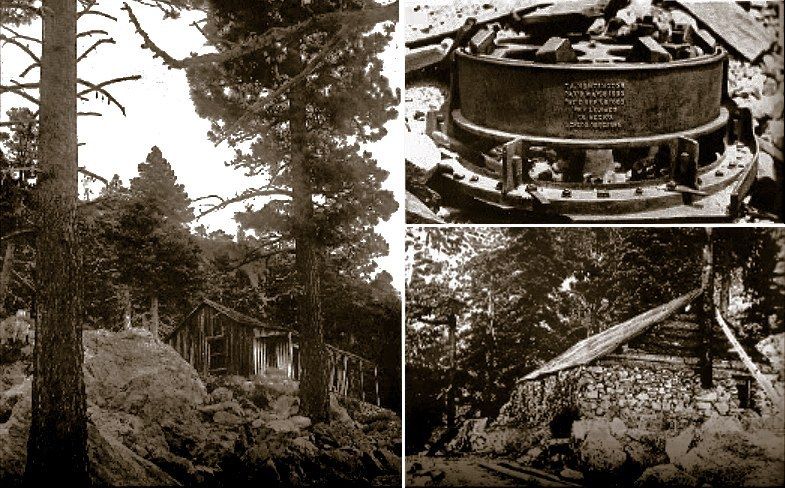
As far as the actual mine, I was unable to find it, although I know the approximate location. I'll probably go back up there
and try again, digging out the portal if I can spot it. Here are some of Hugh Blanchard's photos from 2005. He measured
the mine at 187 feet. However a mining report from 1900 measured it at 600 feet. I'd be interested in taking a look inside.

The Gold Ridge Mine had several owners over a 10 year period. Although gold was found it was mostly low grade ore.
Ultimately mining operations ended because of uncertain water supply and an avalanche or rockslide that occurred in 1907.
To read more about this mine site, check out my blog at secretmines.com
San Antonio Falls and the San Antonio (Sierra Club) Ski Hut. It operated from 1897-1907. This was a fairly large operation,
with much optimism and little success.

The rock crusher (full name Huntington's Centrifugal Roller Quartz Mill) was invented in 1898. It was a brand new technology
that not only crushed ore, but separated the gold from it. This unit weighs a ton and probably cost a bundle. As far as I know
It's the only one remaining in the San Gabriel Mountains. The inventor, Frank Atwood Huntington patented multiple inventions,
including a gasoline engine that powered one of the first cars in America. This mine site also had a traditional five stamp mill.

This was a gasoline powered unit. You can see in the diagram above where these two pieces went.

Here's a top view of the crusher. This metal is over half an inch thick, so it must have taken a massive hit to break it in half.

This may have been a part of the interior of the rock crusher. Or part of the mount. In 1907 the crusher was broken in half
by something referred to as the slide of 1907. It was described as an avalanche, but more likely it was a giant rock slide.

These metal straps were probably used to secure the rocky hillside (unsuccessfully). They can be found next to the mill.

Here's a view of part of the mine site in the late 1800s. All of this was probably washed away by the great flood of 1938.
To me this looks like a water dam at the top, an ore hopper below and the stamp mill was probably behind this structure.
The circular barrel to the right looks like a cyanide leeching tank made out of redwood.

These are the remains of the mess hall (kitchen). Nearby is a flat where the foreman's cabin rested.

This is part of the stovetop. Remnants of the stovepipe can be found nearby.

Pieces of the stovepipe found inside the ruins.

An early morning view from near the mess hall ruins looking south, towards Claremont.

Here's a view from inside the ruins, looking toward Baldy Bowl

Vintage photos from the mine site, left is the foreman's cabin, right top is the crusher before it was broken (markings
say it was manufactured in Mexico), right bottom is the mess hall. Photos are part of the Will Thrall collection.

As far as the actual mine, I was unable to find it, although I know the approximate location. I'll probably go back up there
and try again, digging out the portal if I can spot it. Here are some of Hugh Blanchard's photos from 2005. He measured
the mine at 187 feet. However a mining report from 1900 measured it at 600 feet. I'd be interested in taking a look inside.

The Gold Ridge Mine had several owners over a 10 year period. Although gold was found it was mostly low grade ore.
Ultimately mining operations ended because of uncertain water supply and an avalanche or rockslide that occurred in 1907.
To read more about this mine site, check out my blog at secretmines.com
